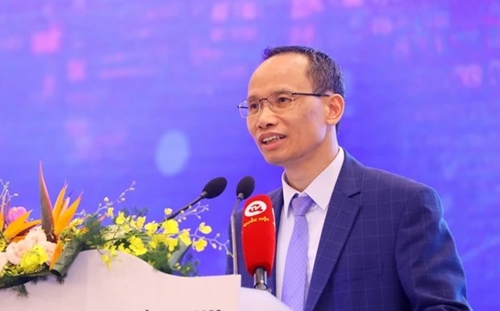The first highlight was that the GDP grew quarter over quarter and by 5.05% for the whole year, higher than the global average of about 2.9% and the ASEAN average of 4.3%, he told a recent conference between the Government and local administrations.
    |
 |
|
Dr. Can Van Luc, chief economist at the Bank for Investment and Development of Vietnam (BIDV) |
Elaborating the second highlight, the economic expert said industrial production recovered from the minus 8% recorded during the first months to 3% by the end of 2023. The decline in exports gradually eased during the year, from minus 26% to minus 4.4%.
Businesses recovered and faced fewer difficulties as seen in the number of new companies, which used to be lower than those withdrawing from the market but became 1.3 times higher in the fourth quarter.
Luc pointed out that tourism also bounced back while agriculture successfully weathered headwinds.
In addition, the macro-economy was basically stable. Inflation stood at 3.25%, compared to the 5.5% worldwide. The core inflation fell to 4.16% from the previous figure of 5.1%, showing that inflation decreased rather sustainably. Foreign exchange rates were kept stable and the financial and monetary markets basically controlled well amid multiple risks in the world, especially the recent bankruptcies of large banks in the US and Switzerland.
He went on to say that fiscal risks were at a moderate level, and public and foreign debts, budget deficit, while the Government’s debt repayment liability were within permissible levels set by the National Assembly (N.A.). Food security was guaranteed; while the stock, corporate bond, and real estate markets also gradually recovered though many risks remain. Given this, Vietnam’s credit rating was upgraded by Fitch Ratings.
The third highlight lies in the highly impressive results of economic integration and people-to-people diplomacy, he added.
Among the three lessons of last year, the expert noted Vietnam made timely policy response, especially the monetary policy. It was reversed right from the end of the first quarter, from a solid policy to a flexible, eased, and prudent one. Interest rates were reduced and businesses and people’s debts permitted to be restructured. An expanded focus-driven fiscal policy, along with mechanisms and policies aiding post-pandemic recovery, was also maintained in 2023.
The second lesson was to pay attention to and carry out plans, Luc said, noting that many important laws and policies for tackling difficulties in the fields of health care, education, land, construction, real estate, capital, and tourism were issued and implemented strongly.
The third was the consensus across the political system. Guidelines of the Party, legislation, and law enforcement were carried out rather comprehensively, with the engagement of the N.A., the Government, ministries, sectors, localities, and businesses.
He forecast in 2024, the global economy will basically stay flat or decline compared to 2023. Inflation will fall but remain high, interest rates around the world will also be very high, and there will be numerous risks to energy and food security, negatively affecting investment, consumption, and export in Vietnam.
The country needs to exert all-out efforts to reach the N.A. and Government’s targets for growth of 6 - 6.5% and inflation of 3.5 - 4%, according to the expert.
Source: VNA